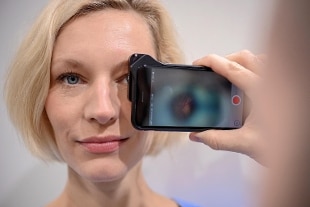Glaucoma, the thief of sight
Share
November 10, 2020A study published in the journal Nature Communications, conducted by experts from the University of Cambridge, could increase
treatment
patterns
for glaucoma, a leading cause of blindness globally.
It involves using
gene therapy to repair damage to the optic nerve by
increasing the production of the protein ZFYVE27 or protrudin.
"Axons, or nerve fibers, in the central nervous system (CNS) do not normally regenerate after injury or disease - explains Richard Eva, a researcher at Cambridge - which means that the damage is often irreversible. But over the past decade, a number of studies suggested the possibility of stimulating a regeneration ".
The
team investigated this possibility that the gene responsible for the production of the ZFYVE27 protein could lead to the regeneration of nerve cells
protecting them from cell death following injury.
Thanks to a cell culture system, the research team achieved the growth of biological units in vitro, and the axons were then damaged with laser.
"We found that increasing the amount and activity of ZFYVE27 in nerve cells - adds Martin, colleague and co-author of Eva - greatly increases their ability to regenerate. Cells in the retina, known as retinal ganglion cells, extend the axons from the eye to the brain organ and the optic nerve allows the transmission and processing of visual information ".
To test the ability of the ZFYVE27 protein to stimulate repair of the damaged central nervous system in an intact organism, the
scientists used a gene therapy technique on a sample of rodents
.
"When we measured regeneration a few weeks after a crush injury to the optic nerve," says James Fawcett, third paper signer and researcher at Cambridge University, "we noticed a remarkable repair capacity.
This technique could help protect against glaucoma
, a rather common condition among vision problems ".
Glaucoma, as experts explain, leads to progressive damage to the optic nerve and, if not diagnosed early, can result in loss of vision.
"In the
United Kingdom
- comments Veselina Petrova of the Department of Clinical Neuroscience of the University of Cambridge, co-author of the article -
about 2 percent of people over 40 years of age and 10 percent of people over 75 are affected by glaucoma
. of one of the main causes of blindness worldwide and we do not yet have a complete picture of the causes that can cause this condition ".
The expert argues that the use of gene therapy could lead to real benefits.
"Further studies will be needed - stresses Petrova - to evaluate the effectiveness of the treatment in humans. Our hope is that increasing the production of this protein may also facilitate cell regeneration following injury to the brain and spinal cord, as well as to the optic nerve ".

